“First, yes and beeches, and then science.”
Alphabet. ABC.In Greek, the first letter is called alphaand the second - vita. Letters in a specific order were called the alphabet. In the same way, the word was formed in Russian aBC.Earlier letter BUTwas called az, and the letter B – beeches. These obsolete names are preserved in the word alphabet.
T. Andrianova. "A word about words." " elementary School"No. 2 1990.
"ABC. Az. "
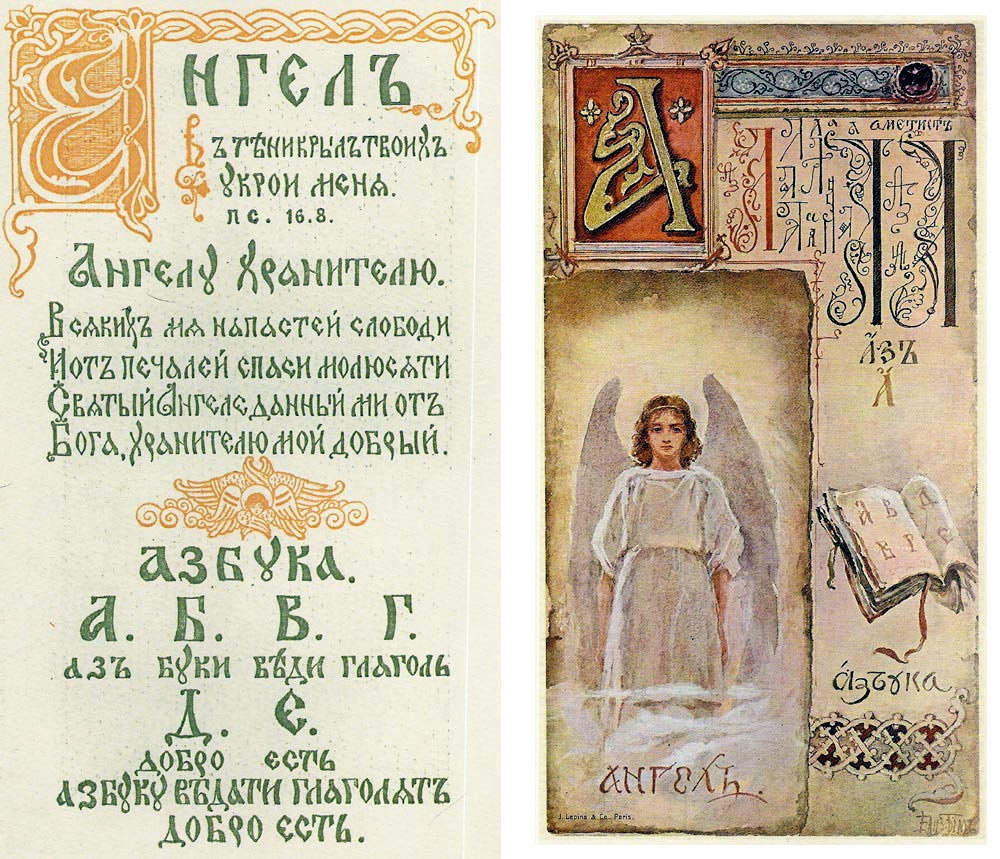
"ABC. Beeches. "
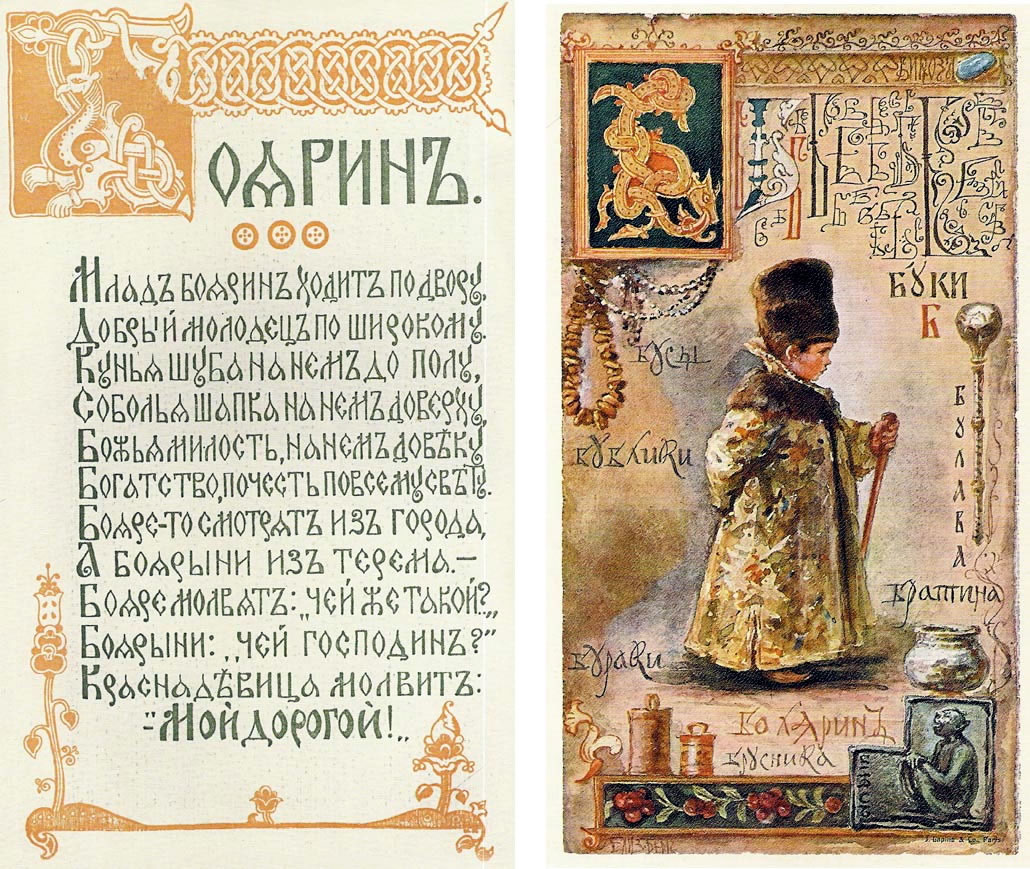
"ABC. Lead. ”

"ABC. Verb. "
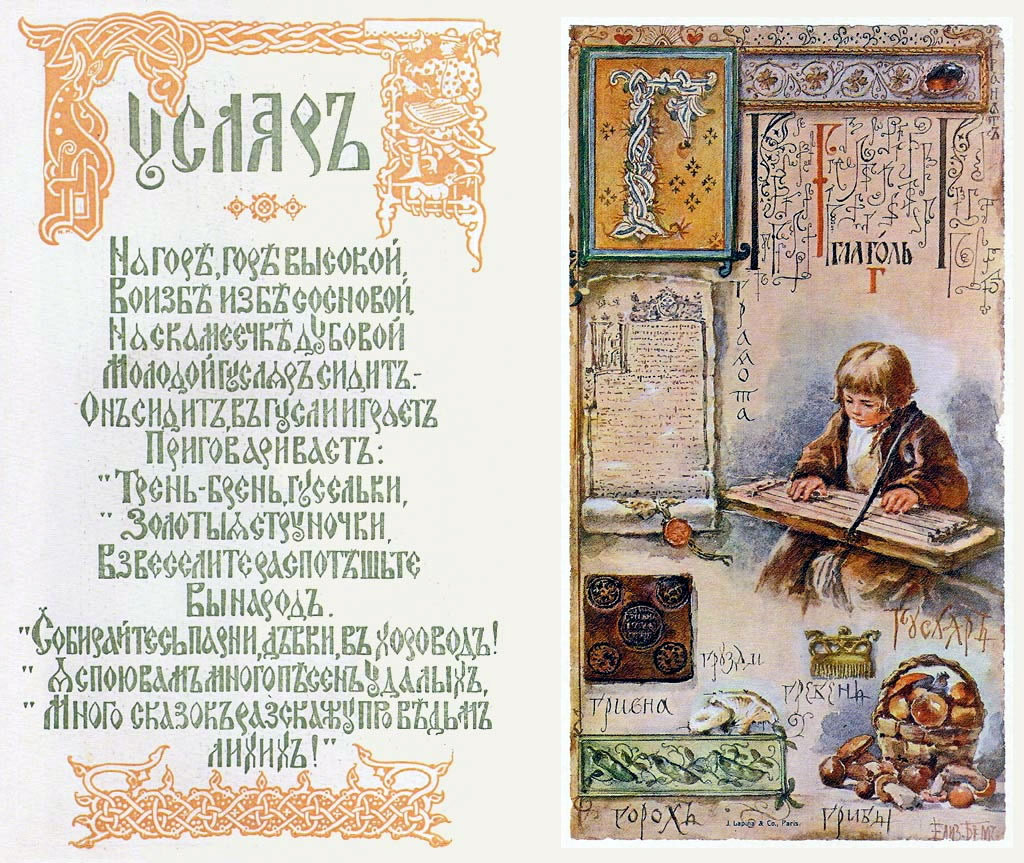
"ABC. Good."
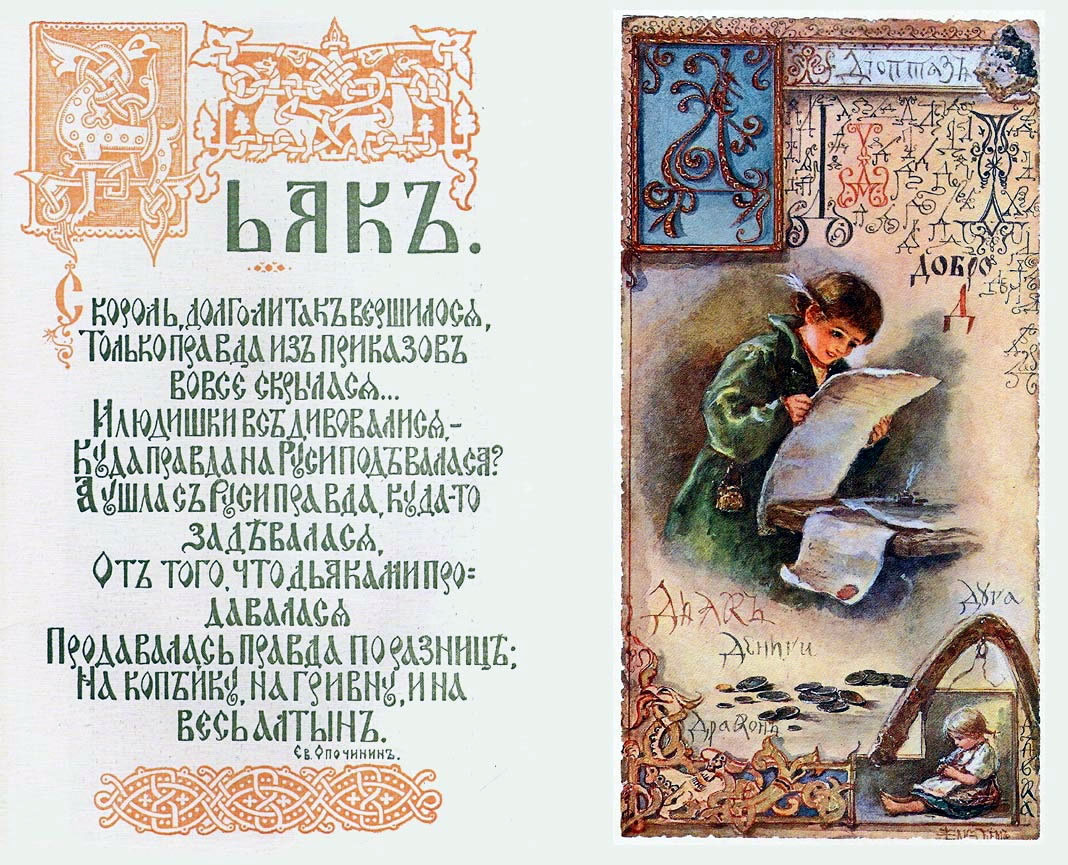
"ABC. There is."
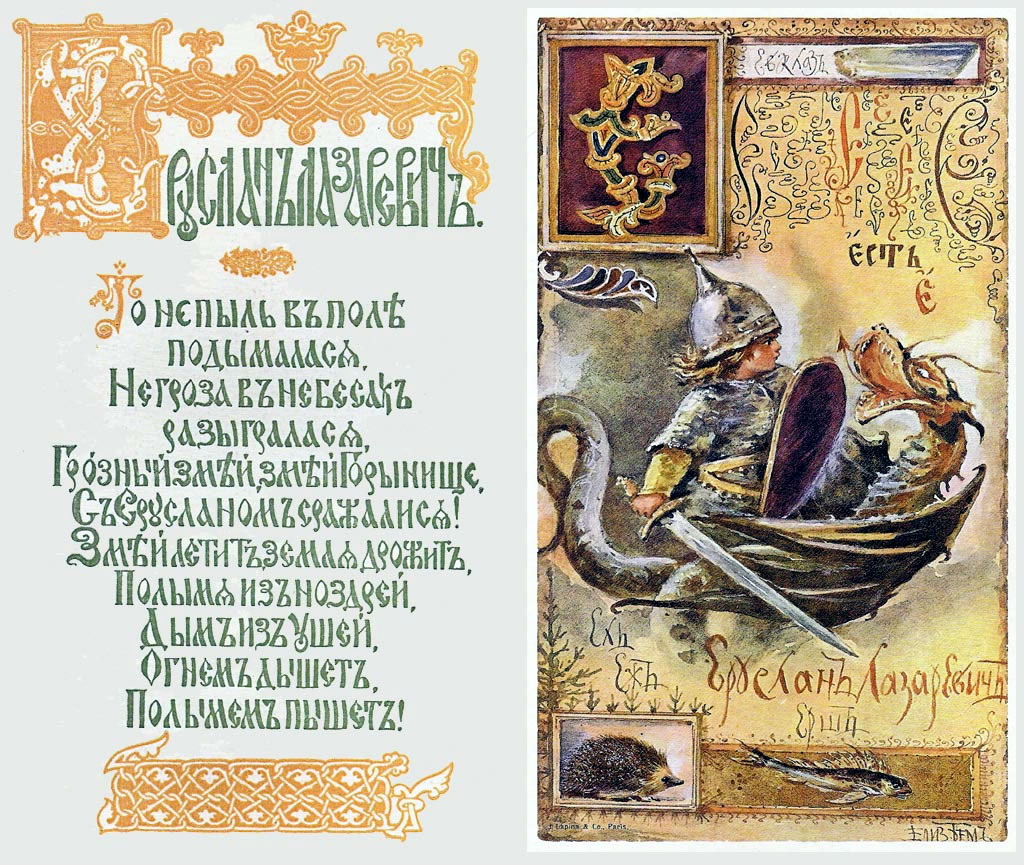
"ABC. Live. "

"ABC. Land."
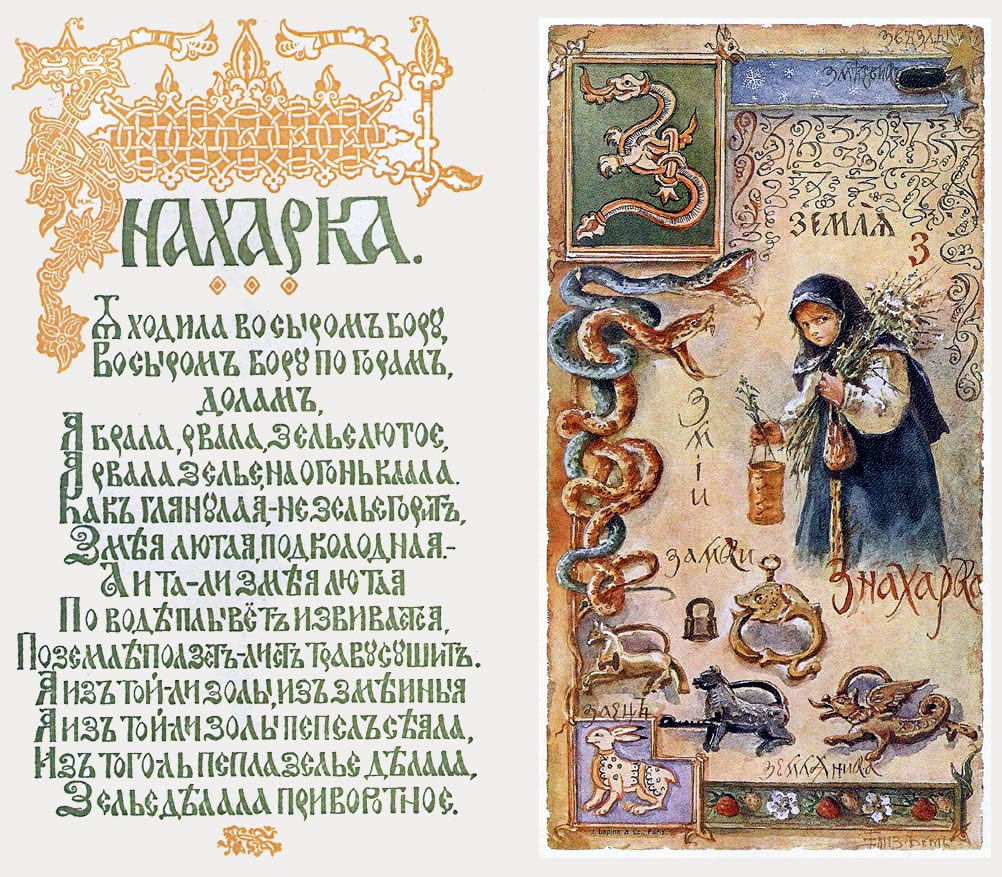
"ABC. Izhe. "

"ABC. Kako. "
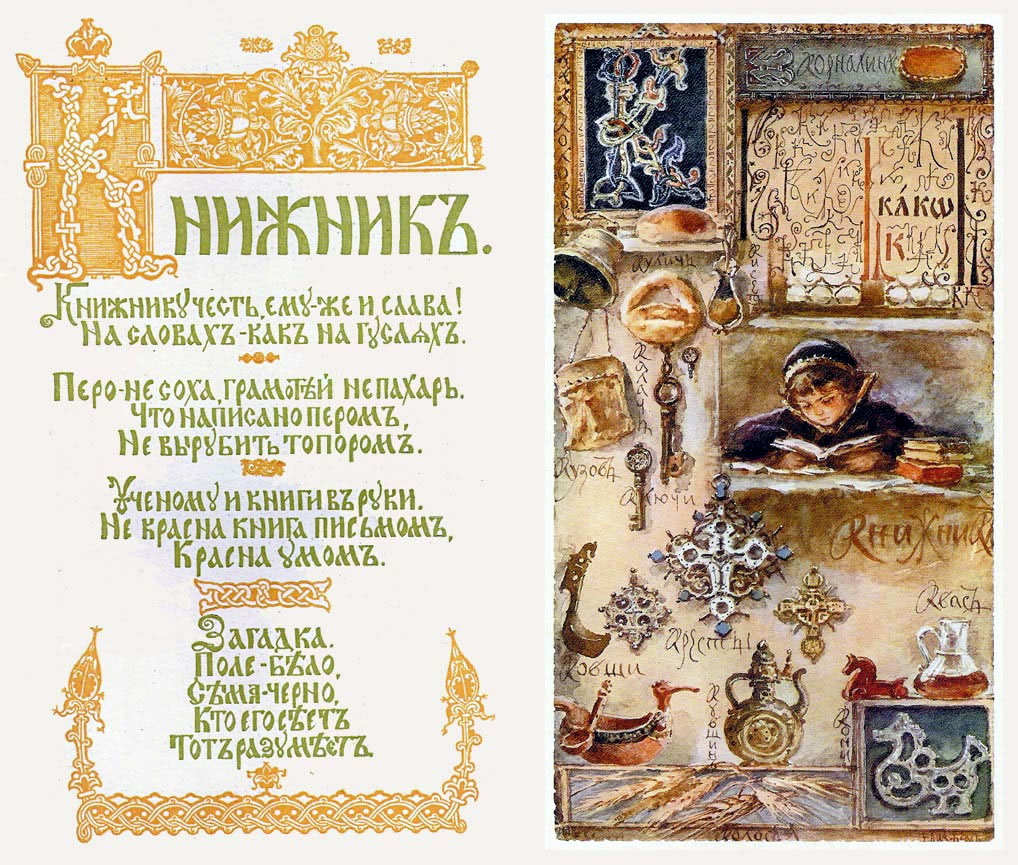
"ABC. People."
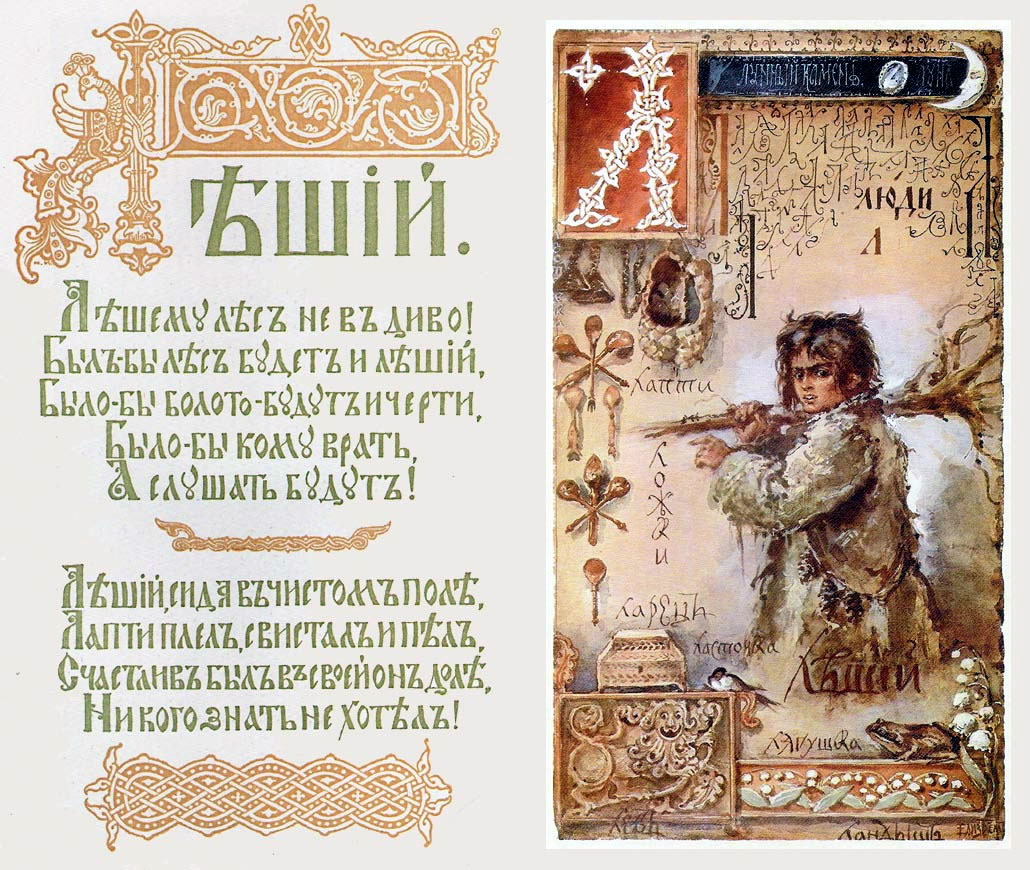
"ABC. Think. "

"ABC. Our."

"ABC. Is he."
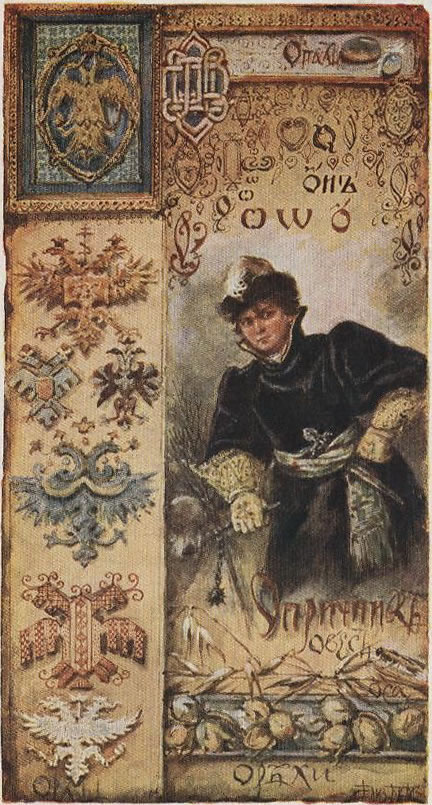
"ABC. Peace. "
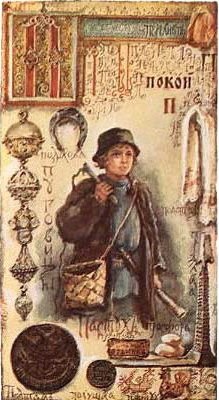
"ABC. Rtsy. "

"ABC. Word."
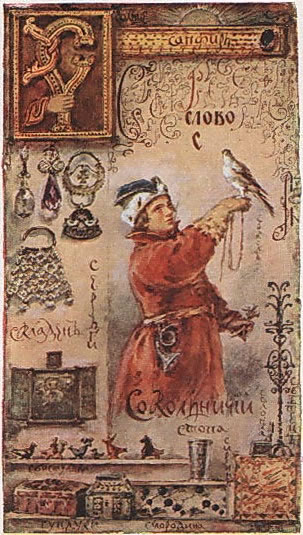
"ABC. Firmly."
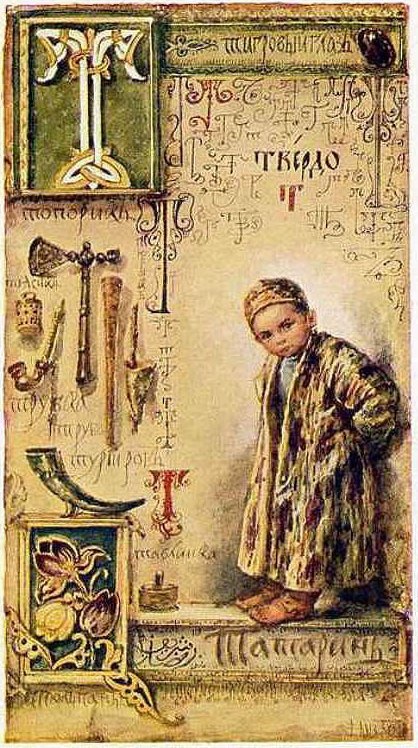
"ABC. UK. "

"ABC. Firth. "

"ABC. Dick."

"ABC. Tsy. "

"ABC. Worm."

"ABC. Shah. "
![]()
"ABC. SchA. "

"ABC. YU."
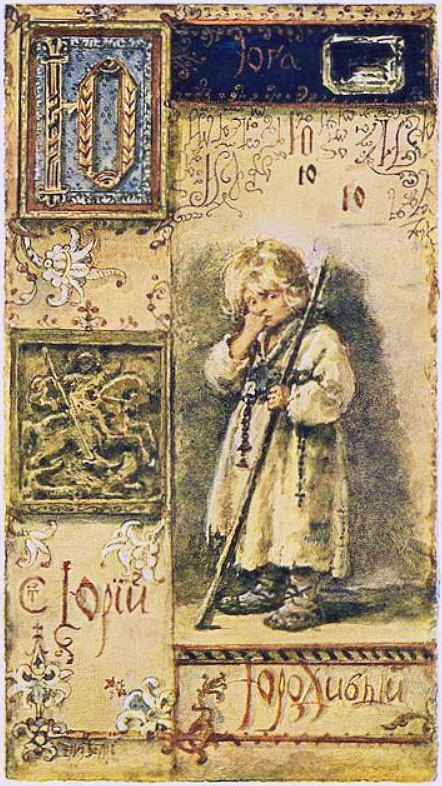
"ABC. I."

ABC: message to the Slavs.
The Russian Alphabet is not only a set of letters corresponding to sounds, it is also a whole message to the Slavs, deciphered for the first time by our author.
The Russian Alphabet is a unique phenomenon among all known methods of letter writing. It differs from other alphabets not only in its perfect embodiment of the principle of uniqueness of graphic display: one sound - one letter. In the ABC, and only in it, there is content. And the reader will see for himself now.
First, remember the phrase "Every hunter wants to know where the pheasant sits." It has been known to everyone since childhood and makes it easy to remember the sequence of colors of the rainbow. This is the so-called acrophonic way of remembering: each word of the phrase begins with the same letter as the name of the color: each is red, the hunter is orange, etc.
However, acrophonic memorization is far from a children's game. For example, after S. Morse’s invention in 1838 of a code for telegraphic communications, a problem arose with the mass training of telegraph operators. Learning Morse code quickly was more difficult than the multiplication table. A solution was found - for the convenience of memorization, each Morse sign was associated with a word starting with the letter that this sign conveys: for example, a dash-dot that conveys "a" is called "watermelon".
Acrophonia helps to quickly remember the ABC and thereby maximizes its rapid spread.
Among the main European alphabets, only three are more or less endowed with acrophonicity: Greek, Hebrew, and Cyrillic (\u003d Glagolitic). The Latin alphabet does not have this property, so it could appear only on the basis of already widespread written language, when acrophony is no longer essential.
In the Greek alphabet, the remnants of acrophonia can be traced in the names of 14 of 27 letters: alpha, beta (more correctly - vita), gamma, etc. However, these words mean nothing in the Greek language, they are slightly distorted derivatives of the Hebrew words alef (bull), bet (house), gimel (camel), etc. Hebrew still fully maintains acrophony, which, by the way, contributes a lot fast learning immigrants in Israel. Comparison on the grounds of acrophonicity directly indicates that the Greeks borrowed part of the Hebrew script.
The Orthodox Alphabet is also completely acrophonic, but in one respect it differs significantly from Hebrew. In Hebrew, the names of letters are nouns in the singular and nominative case, and among the names of 29 letters of the Slavic alphabet at least 7 words are verbs (see table). Of these, four are in the imperative mood: two in the singular (rtsy, tsy) and two in the plural (think, live), one verb in indefinite form (s), one in the 3rd person singular (is) and one in past tense - “lead.” (Note: in "ancient" Hebrew, the concept of verb none at all). Moreover: among the names of letters there are pronouns (kako, shta), and adverbs (firmly, zelo), and plural nouns (people, beeches), as in ordinary speech.
Comparative analysis of the Pre-Slavic Alphabet, Greek alphabet, Hebrew and Latin
Letters that are not in their alphabetical ordinal places are taken in brackets. Letters transmitting other sounds or not transmitting sounds are marked in italics. The numerical values \u200b\u200bof Church Slavonic and Greek letters are also given.
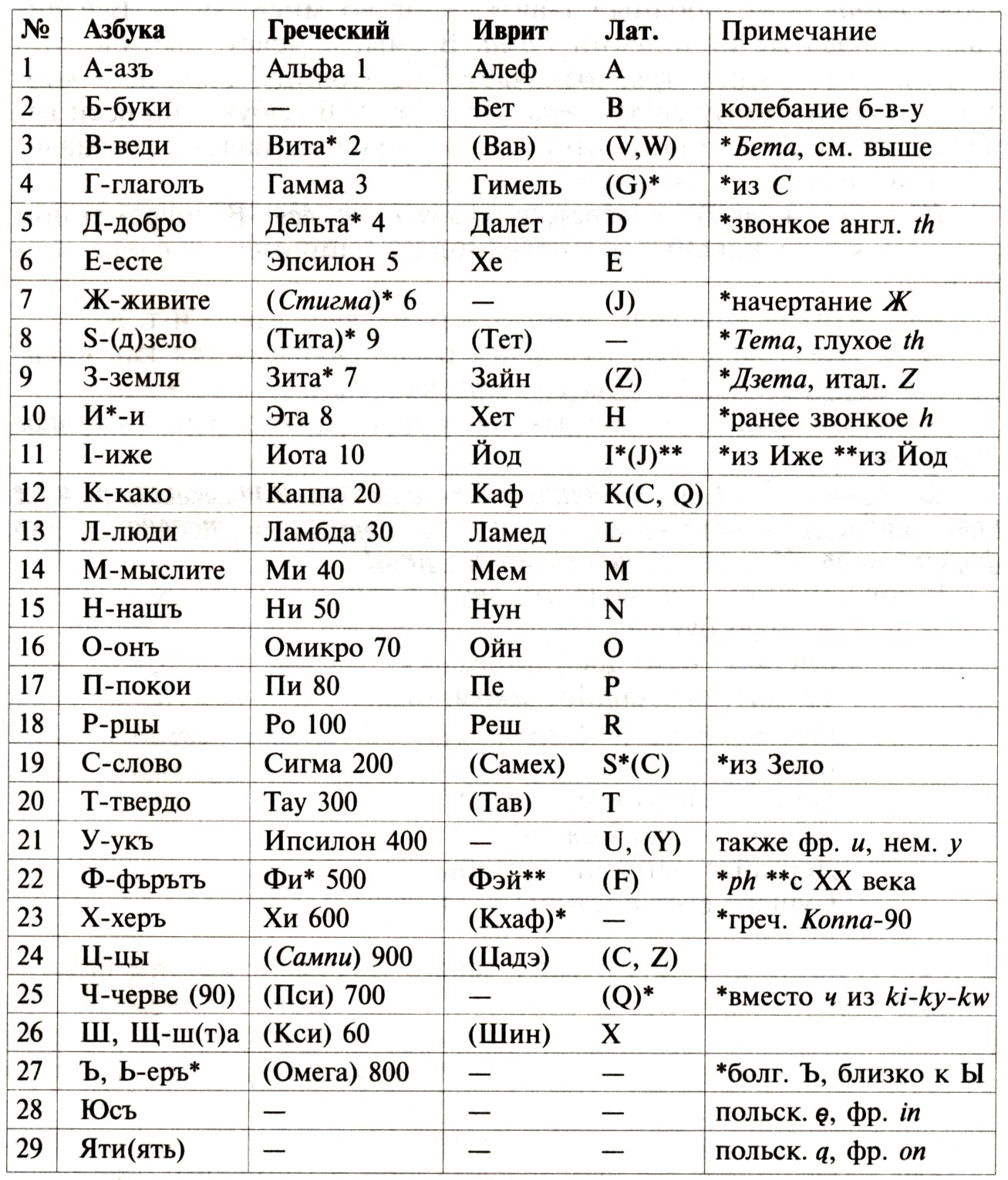
In normal coherent speech, one verb falls on average to the other three parts of speech. In the names of the letters of the Pre-Slavic Alphabet, it is such a frequency of the verb that directly indicates the coherent character of the alphabet names.
Thus, the Pre-Slavic Alphabet is a Message - a set of coding phrases that allow each sound of the language system to give an unambiguous graphic correspondence - that is, a letter. In this case, the lettering systems for transmitting the same sound system can be different, for example, Cyrillic \u003d Glagolitic for the Proto-Slavic language, Cyrillic \u003d Latin for the modern Serbo-Croatian language, three equal systems of medieval Georgian writing, known from history, etc.
And now we will read the Message contained in the Pre-Slavic ABC.
Consider the first three letters of the alphabet - Az, Buki, Vedi.
Az - "I".
Beeches (beech) - letters, letters.
Lead(vede) - “knew”, the perfect past tense from “vediti” - to know, to know.
Combining the acrophonic names of the first three letters of the ABC, we get the following phrase: Az buki vede
“I know the letters.”
All subsequent letters of the ABC are combined into phrases:
Verb - “word”, and not only spoken, but also written.
Good - "wealth, acquired wealth."
there is (nat) - 3rd l. units hours from the verb "to be."
Verb good nat
: a word is an asset.
Live(instead of the second “and” the letter “yat” was written earlier, you pronounced live) - imperative mood, plural of “live” - “live in labor, and not vegetate”.
Zelo (the combination of dz \u003d voiced c was conveyed) - "assiduously, with zeal."
Land- “planet Earth and its inhabitants, earthlings».
AND- union “and”.
Like - "those that they are."
Kako - “like,” “like.”
People - "reasonable creatures."
Live zealously, the earth and others like you: live, working hard, earthlings, and as befits people.
Think (it was written with the letter "yat", pronounced "thought", as well as "live") - the imperative mood, pl. h. from "think, comprehend the mind."
Our - "ours" in the usual sense.
He - “thereof” in the meaning of “single, single”.
Chambers (peace) - “the basis (of the universe)”. Wed “Rest” - “be based on ...”
Think of our peace: comprehend our universe.
Rtsy(rtsi) - imperative: "speak, speak, read aloud." Wed "Speech".
Word - "transmitting knowledge."
Firmly - "confidently, confidently."
Rtsy word is firmly - "carry knowledge with conviction."
Uk - the basis of knowledge, doctrine. Wed science, learn, skill, custom.
Fert f (b) Ryt- "fertilizes." The alphabet recorded the difference in the sounds “p” and “f”, as well as their sonorous analogs “b” and “c”. In the Middle Ages, the South Europeans who pronounced “f” instead of “p” were called “jerks” in Russia precisely because of the peculiarities of speech: this, for example, distinguished the southern Franks from the northern Prussians, the Thracians from the Persians, etc.
Her - "divine, given from above." Wed him. Herr (lord, God), Greek “Hiero” (divine), English hero (hero), as well as the Russian name of God - Horse.
Uk fier Her: knowledge fertilizes the Almighty, knowledge is a gift of God.
Tsy(qi, tti) - “sharpen, penetrate, penetrate, dare”.
Worm (to the worm) - “he who sharpens, penetrates.”
W (t) a(W, SH) - “what” in the meaning of “to”.
B, b (er / yer, yr) - are variants of one letter, meaning an indefinite short vowel, close to uh.
The rumbling sound “p” is pronounced with the obligatory initial aspiration (initial “b”) and echo (final “b”). The word "yar", apparently, meant the existing, eternal, innermost, space-time, inaccessible to the human mind, the lamp, the Sun. In all likelihood, “bp” is one of the most ancient words of modern civilization, cf. Egyptian Ra - The Sun, God.
The word "time" itself contains the same root, since the initial "c" developed precisely from "b". Many primordially Russian words contain this root, for example: morning - “from the Sun” (the root ut - from there, there); evening (century p) - “century Raexpiring time of the sun. "
In the sense of “space, the Universe,” Russian originates from the same root "frame". The word "paradise" means: "many suns" \u003d "abode of the gods (God Ra)." Gypsy self-name "Rum, rum" - “free”, “God is in me”, “I am the Universe”, hence the Indian Frame. In the sense of “light, luminary, source of light”: cry "Hooray!" means “to the sun!” yarcue - “like sunshine”, “ raarc ", etc. In the ABC, in all probability, the word" bp (a) "is in the genitive case with the meaning of" Existing ".
Yus (us small) - “light, old Russian clear". In modern Russian, the root "Clear" preserved, for example, in the word "clear."
Yat(yati) - “to comprehend, to have). Wed ex to ya, take to ya etc.
“Hey, worm, shta yus yati!”
stands for “Dare, sharpen, the worm, to understand the Light of Jehovah!”
The combination of the above phrases is alphabet Message:
Az books. The verb is good nat. Live zelo, the earth, and, like any other people, think of our chambers. Rtsy word is firmly - uk fart. Tsy, worm, shta yra yus yati!
In a modern translation, it sounds like this:
I know the letters:
writing is an asset.
Work hard, earthlings,
as befits intelligent people -
comprehend the universe!
Carry the word with conviction:
knowledge is a gift of God!
Dare, delve into
Realize the light to comprehend!
Yaroslav Kesler. "Alphabet: a message to the Slavs." Reading "Miracles and Adventures." Moscow, "Desnitsa". 2002 year.
"ABC. Yer Yer. Yer Yat. E. Yus. From. Xi. Psi. Fita. Izhitsa. "

As I have already mentioned, the Alphabet was given to the TERANS at once - brought from the Moon by the Heavenly intercessors - Slovans, and did not develop, as in the theories of most of the scientists of Thera. Over time, he was perverted, poher ("Herr" - the Lord in German) God's slaves and his avatars. While the giants were alive, they periodically restored it, almost to modern look. The servants of God mutilated and divided him, forked in pseudo directions and dead ends. The main line of the involution and decay of the alphabet (and language), not counting the side branches, looks something like this: Slovenian - Slavic - Hebrew - Ancient Greek (Judeo-Hellenic) - Latin and so on. With the advent of Christianity, God's work began to boil with a new force to divide the remnants of spiritual unity and culture into information principalities and clans. So the gods broke their tongues and divided people to rule the World. Such tools were: the Orthodox church alphabet, the ligature of the Koran, Sanskrit, Hebrew, Latin, and many other alphabets of the torn World. The word "alphabet" in transit comes from the Judeo-Hellenic "Aleph and Vita", Aleph - Bull (alpha) - God, Vita - life. And the name of the Russian alphabet, by the name of the first letters: Az - Ass (God). (“I am,” “I am God,” says the avatar of God, the king says so.) For example: the word Sanskrit (not so ancient), in Spanish, “San Escripto” means “Scripture, so there’s no need to fool the little ones about Sanskrit antiquity and exclusivity is a piece from a common, once a single group of languages. Words (more than 100 words) from Sanskrit and even whole phrases are identical to the modern Russian language. (For example, the phrase “WILL STAND BY THE HAND” in Sanskrit and Russian sounds the same!). Also, many almost identical words, similar in sound and meaning, are found in any other languages \u200b\u200band dialects of the world.
The Indian Vedas describing wars against gigantic non-Aryan peoples are for the most part genuine, just very distorted narratives of the affairs of bygone days. These are stories distorted by the "national" Hindu flavor, borrowed from the libraries of the old world. Information was exported to the East, in Shambhala, to create various world religions, pseudo teachings on the discipline of the body and the purification of the body and soul. The great spiritual godfathers of the East propose to do this. different waysfor example, with the help of the Kama Sutra, bestiality or ablution in the stinky, swarming with the infectious and dead bodies of the Ganges (liquid cemetery in India). True, some elements of yoga, in spite of the attention of the “great confessors”, have preserved Ancient practicality, everything else is more “spiritual” garbage in a colorful and odorous package.
CREATION OF THE “OWN” DEVIL OF LITERATURE HAS POSSIBILITY OF THE SERVANTS OF THE LORD DEVIL TO REWRITE HISTORY, THINK AND WRITE YOUR VERSION OF “CREATING PEACE”, BLEND LUMBERS, WITHOUT RETAINING.
B. Pyatibrat. The Deep Book.
Research work
Az da Buki - that's all science
Work completed
MOU "Chapaevskaya Secondary School"
Head of work
1. Introduction
2. The purpose, objectives, object of study
3. Abstract literature
4. Comparison
1. History
2. The true meaning of the letters
3. The results of the study
4. Conclusions and conclusions
5. Applications
6. Bibliographic list
Introduction
In the lessons of teaching, literacy, studying the alphabet, I learned that before the alphabet was different. The letters had their names. Why did the alphabet change? Where did the mysterious letter shapes go? This interested me very much, and I decided to conduct research work.
My work is called "Az da Buki - that's all science." This proverb contains a deep meaning, which we often do not know about. As you know, our today's alphabet goes back to the letters of the Cyrillic alphabet - the Slavic alphabet.
Objective:
Find out which alphabet is the most convenient for reading and writing.
Tasks:
Learn the history of the Old Slavonic alphabet.
He will get acquainted with the letters of the Old Slavonic alphabet.
Reveal the meaning of the proverb "Az da Buki - that's all science."
Compare the Old Slavonic alphabet and the modern alphabet.
Object of study:
Old Slavonic alphabet and modern alphabet.
Literature abstract:
I began my research with the search and study of literature on the topic
1. K. Titarenko “The Secret of the Slavic Alphabet”, 1995. I found out how the letters were arranged in the Old Slavic alphabet.
2. A. Zinoviev “The Cryptography of the Cyrillic alphabet”, 1998. The secrets of writing are revealed.
3. M. Krongauz “Where did the Slavic writing come from”, w / o “Russian language” 2006, No. 3 The history of the emergence of Old Slavonic writing.
"Az da Buki - that's all science."
There is a legend about the appearance of the Old Slavonic alphabet. Legend has it that God revealed the Philosopher's writings at the time of prayer. And historical sources specify: the divine revelation was preceded by a long period of studying by Constantine the languages \u200b\u200bthat were considered sacred - Hebrew, Greek and Latin. Scripture existed in these languages. At the last two services were held. In sacred texts, everything makes sense: not only the content, but also the form of the record, even the arrangement of the letters of the alphabet. And Konstantin, who perfectly knew the wisdom of his time (not without reason he was called the Philosopher!), Created the Slavic alphabet in the "image and likeness" of the sacred alphabets and "arranged" the Slavic alphabet as a model of the world and as a story of a righteous and unrighteous person.
Az and Buki, the first two letters of the Cyrillic alphabet, which formed the familiar ABC word, denoted two characters, two characters. Az is a good born “to be the first”, “a bright prince”. Beeches - a bad, empty person, a meaningless creature.
The letters in the Cyrillic alphabet were not arranged in a line, but in two columns with a certain number of letters. In the right column (the word "right" comes from the word "truth") - "good" letters associated with Az - the first. In the left column - "bad" letters, "Bukina".
The letters of the first column narrated about the life of Az - the righteous, striving for truth and attaining the highest glory and eternal life. The other was told about the life of Buki - an empty one, mired in vanity, who became a thief and a swindler, a renegade and a heretic, who was caught, tortured, thrown into prison and finally put to death by a fierce death.
These stories were examples of an appropriate and inappropriate life that a schoolboy got to know when embarking on literacy. They sounded like parting words to a person choosing a life path, urged them to study, think and love the Word.
The letters of the right side were written and remembered easier, the letters of the left side had a complex, elaborate form. To master them was much more difficult. So, everything in this alphabet worked for moral education: the student, the life lesson offered to him, had to learn both language, eyes and hands.
Over time, the letters lost their original name: Az turned into the letter "A", Buki - into the letter "B" (be), lead - into "B" (ve) - and so on. The writing of letters is simplified, and many letters of the left column have completely disappeared from use. The alphabet is no longer sacred to us and parting words to life.
The Russian alphabet (Russian alphabet) is the alphabet of the Russian language, in its current form with 33 letters, actually existed since 1918 (officially only since 1942: it was previously believed that the Russian alphabet had 32 letters, since E and E were considered as variants of the same letters).
Acquainted with the Old Slavonic alphabet and the modern alphabet, I compared them according to the table:
* Letters excluded from the Russian alphabet by the 1918 reform
** Letters excluded from the Russian alphabet by the reform of 1711
*** The letters of the Cyrillic alphabet, which have changed styles in the modern Russian alphabet.
Az Is the initial letter of the Slavic alphabet, which means the pronoun I. However, its root meaning is the word "initially", "begin" or "beginning", although in everyday life the Slavs most often used Az in the context of the pronoun. Nevertheless, in some Old Slavonic writings can be found Az, which meant "one", for example, "I’ll go to Vladimir." Or, "start from scratch" meant "start from the beginning." Thus, the Slavs denoted with the beginning of the alphabet the whole philosophical meaning of being, where without beginning there is no end, without darkness there is no light, and without good there is no evil. Moreover, the main emphasis in this is placed on the duality of the dispensation of the world. Actually, the alphabet itself is built on the principle of duality, where it is conditionally divided into two parts: the highest and the lowest, positive and negative, the part located at the beginning and the part that is at the end.
Beech (Beech) - The second letter is a word in the alphabet. It has no digital significance, but it has no less profound philosophical significance than Az. Beeches - it means “to be”, “will” was most often used for turnover in the future form. By and large, it denotes the future, which each person represents for himself in a rainbow, but on the other hand, this word also means the inevitability of punishment for committed low deeds.
Lead – interesting letter Old Slavonic alphabet, which has a numerical value 2. This letter has several meanings: to know, to know and to own. When Konstantin invested in Lead this meaning, he implied intimate knowledge, knowledge - as the highest divine gift. If you fold Az, Beeches and Lead in one phrase, you get a phrase that means "I will know!". Thus, Konstantin showed that the person who discovered the alphabet he created would subsequently possess some kind of knowledge.
Verb - A letter whose meaning is the performance of an action or pronunciation of speech. Synonymous letters Verb are: verb, speak, conversation, speech, and in some contexts the word verb was used to mean “write”. For example, the phrase “May he give us a verb and a word, and thought, and doing” means that “reasonable speech gives us words, thoughts, and actions.”
Good - the fifth letter in the Slavic alphabet, which is a symbol of purity and goodness. The true meaning of this word is "good, virtue." In this case, the letter Good Konstantin put in not only purely human character traits, but also virtue, which all people should adhere to.
Say the letters of the Old Slavonic alphabet by name.
Az beeches lead the verb good
Let's translate each letter and see what happens.
Az and beeches - ABC
The name of the letter B is “lead” in translation - “know”.
The letter G has the name "verb", that is, say.
The letter D is called "good", in Russian it means "good."
What did we get?
Know the alphabet and speak well.
Comparison Results.
The number of letters has decreased (46 in Old Slavonic and 33 in modern)
The name of almost all the letters has changed (eg: A - AZ, L - PEOPLE ...)
The style of 7 letters has changed (e, u, n, s, y, h, w)
Each letter-word of the Old Slavonic alphabet contains a semantic core, unlike the modern alphabet
Output.
If you look back, you will see that Cyril and Methodius created not just an alphabet, they opened the Slavic people a new path leading to the perfection of man on earth and the triumph of a new faith.
Bibliographic list
1. K. Titarenko “The Secret of the Slavic Alphabet”, Rostov-on-Don: Phoenix. -1995 g.
2. A. Zinoviev “The Cryptography of the Cyrillic alphabet”, Moscow: Slovo. - 1998
3. M. Krongauz “Where did Slavic writing come from” // Russian language. - 2006. - No. 3
4. E. Nemirovsky "In the footsteps of the first printer", Moscow: Sovremennik, 1983
5. "Primer", Moscow: Education. - 2007
History of the alphabet in Russian. First az and beeches, and then science. The ABC is taught - they shout for the whole house. Basics and beeches relieve flour. Standing with a furt means a proud pose of a person propping his hands on his hips. To register the Izhitsa - how to punish, teach a lesson, carve.
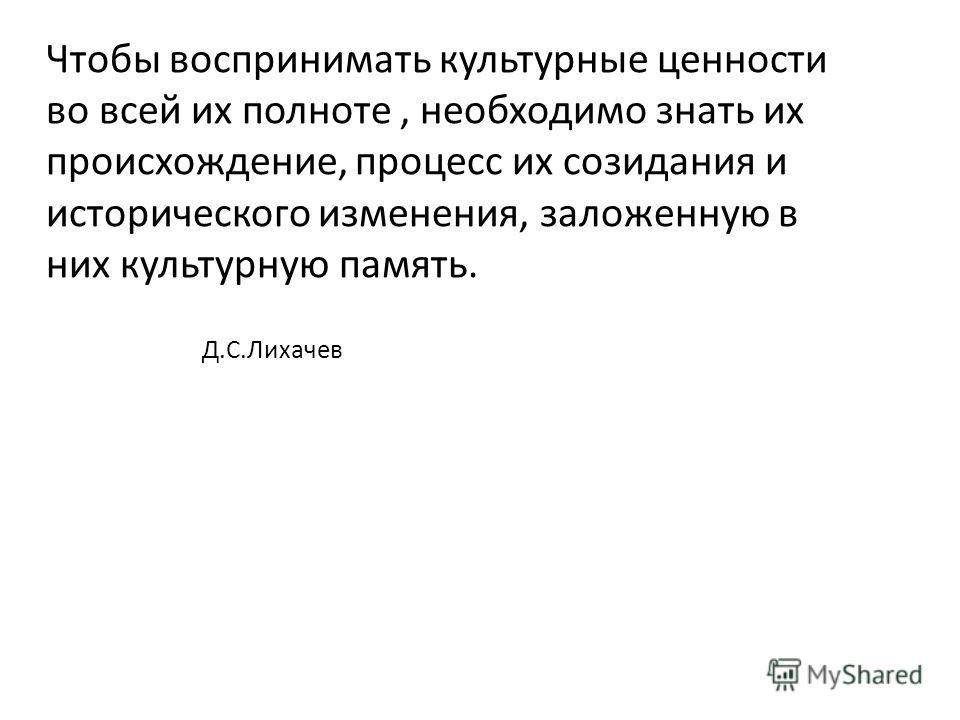

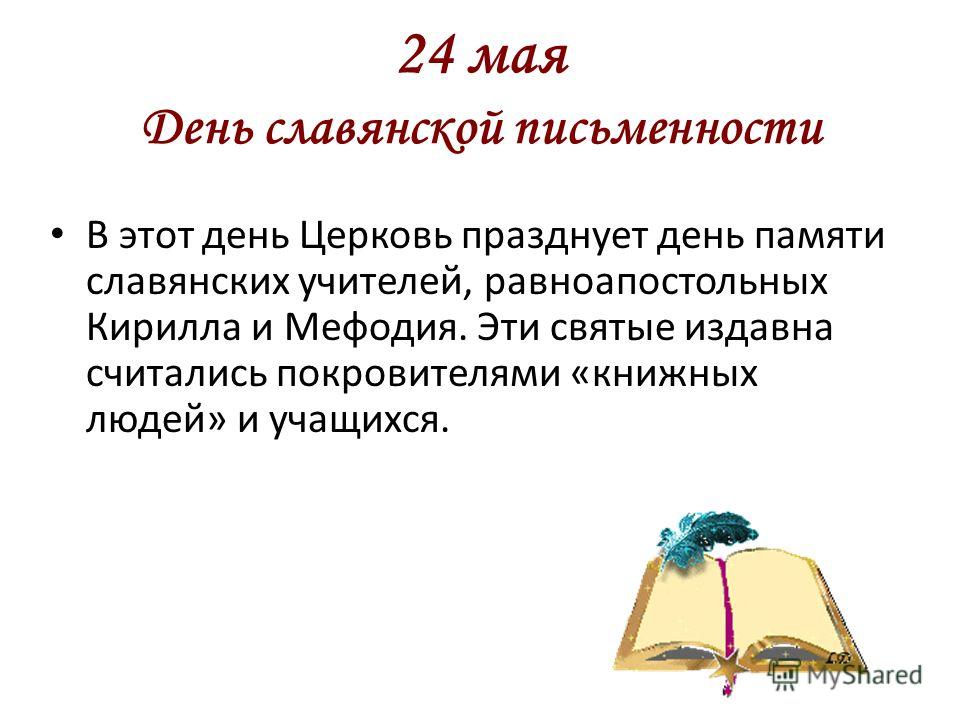
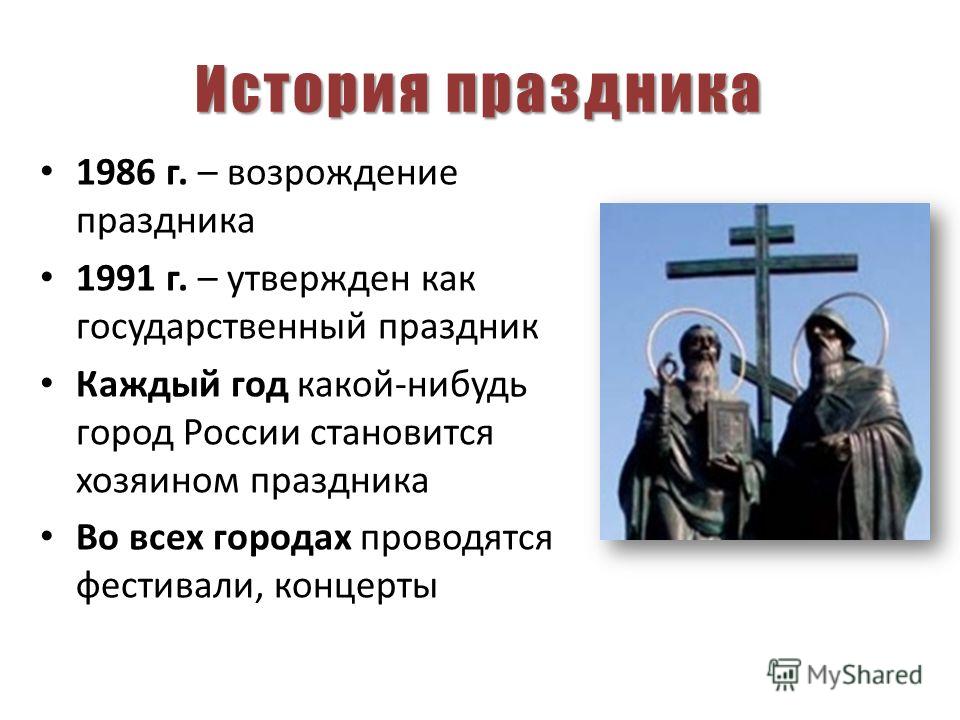
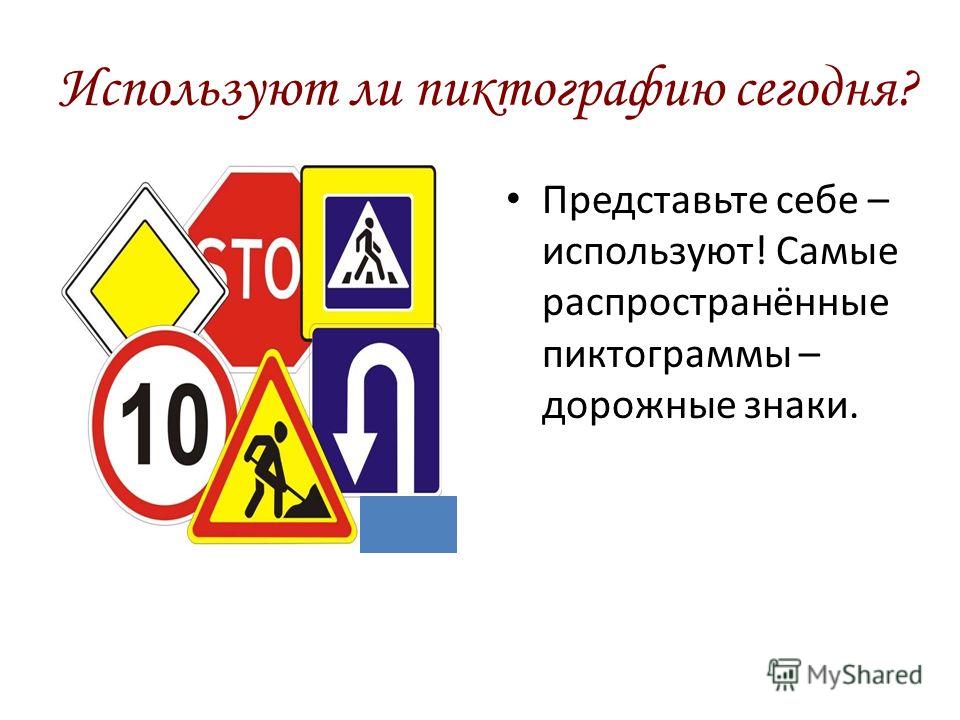
Do you know how Russian writing came about? If you don’t know, then we can tell you. But first answer this question: how is the alphabet different from the alphabet? The word alphabet comes from the names of the first two letters of the Slavic alphabet: A (az) and B (beeches): we can tell you the ABC: AZ + BEECHS and the word alphabet comes from the name of the first two letters of the Greek alphabet: ALPHABET: ALPHA + VITA Alphabet is much older than the alphabet . In the IX century, there was no alphabet, and the Slavs did not have their own letters. And therefore there was no written language. The Slavs could not write either books or even letters to each other in their own language. SLAVIC ABC AND GREEK ALPHABET

Cyril and Methodius The appearance of the Russian alphabet, we owe two brothers - Cyril and Methodius. Once, ambassadors from the Moravian Principality arrived in Byzantium. Their people adopted Christianity, but they were taught by Latin priests who spoke in incomprehensible Latin. The ambassadors conveyed the request of the prince of Moravia - to send to his land such a teacher who would speak his native Slavic language.


One word for the sake of. Cyril was educated at the court of the Byzantine emperor Michael III in Constantinople, where Photius was one of his teachers. He knew Slavic, Greek, Latin, Jewish and Arabic. Rejecting the admiral’s career proposed by the emperor, Cyril became the patriarch librarian. Photius Methodius entered the military service early. 10 years was the leader of one of the regions inhabited by Slavs. Then he retired to the monastery. In the 60s, having abandoned the rank of archbishop, he became abbot of the Polychron monastery on the Asian coast of the Sea of \u200b\u200bMarmara

When Cyril was 7 years old, he saw a prophetic dream: “Father gathered everyone beautiful girls Soluni also ordered one of them to be chosen as a wife. Having examined all, Konstantin chose the most beautiful; her name was Sophia (Greek wisdom). ” So even in childhood, he became engaged to wisdom: for him, knowledge, books became the meaning of his life. Constantine received a brilliant education at the imperial court in the capital of Byzantium - Constantinople. He quickly studied grammar, arithmetic, geometry, astronomy, music, knew 22 languages. Interest in science, perseverance in learning, hard work - all this made him one of the most educated people of Byzantium. It is no coincidence that he was nicknamed Philosopher for his great wisdom. When Cyril was 7 years old, he saw a prophetic dream: “The father gathered all the beautiful girls of Soluni and ordered to elect one of them as wives. Having examined all, Konstantin chose the most beautiful; her name was Sophia (Greek wisdom). ” So even in childhood, he became engaged to wisdom: for him, knowledge, books became the meaning of his life. Constantine received a brilliant education at the imperial court in the capital of Byzantium - Constantinople. He quickly studied grammar, arithmetic, geometry, astronomy, music, knew 22 languages. Interest in science, perseverance in learning, hard work - all this made him one of the most educated people of Byzantium. It is no coincidence that he was nicknamed Philosopher for his great wisdom. Saint Equal-to-the-Apostles Cyril (), nicknamed Philosopher, Slovenian teacher. nicknamed Philosopher, teacher of Slovenian.
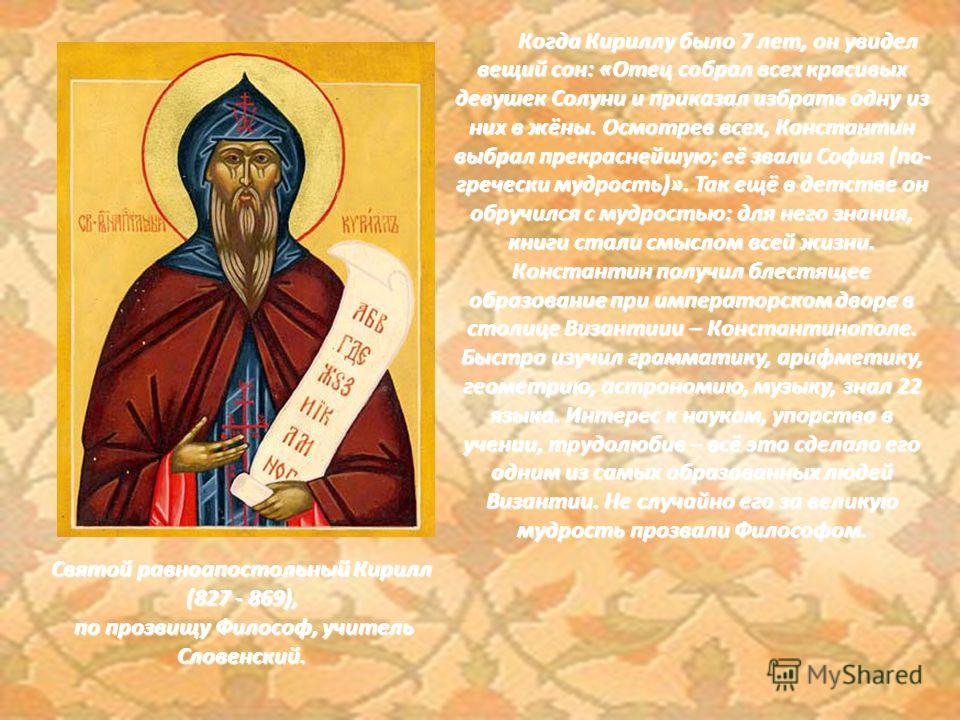
To serve the people by faith and truth and in their own Slavic language. On the way to Rome, they visited another Slavic country, Pannonia, where the Principality of Blatens was located. Here, in Blatnograd, on the instructions of Prince Kotsel, the brothers taught the Slavs book writing and worship in the Slavic language.
![]()
“You must not give up your work: one fell, the other continue the path! "" You can’t give up your work: one fell, the other continue the path! "Before his death, he said to Methodius:" You and I are like two oxen; from a heavy burden, one fell, the other must continue on. ” The German clergy, striving to crack down on Methodius, achieved intrigue by imprisonment; After being released from prison, Methodius continued his activities in Moravia. In lived in Byzantium. In the middle of 884, Methodius returned to Moravia and was engaged in translating the Bible into Slavic
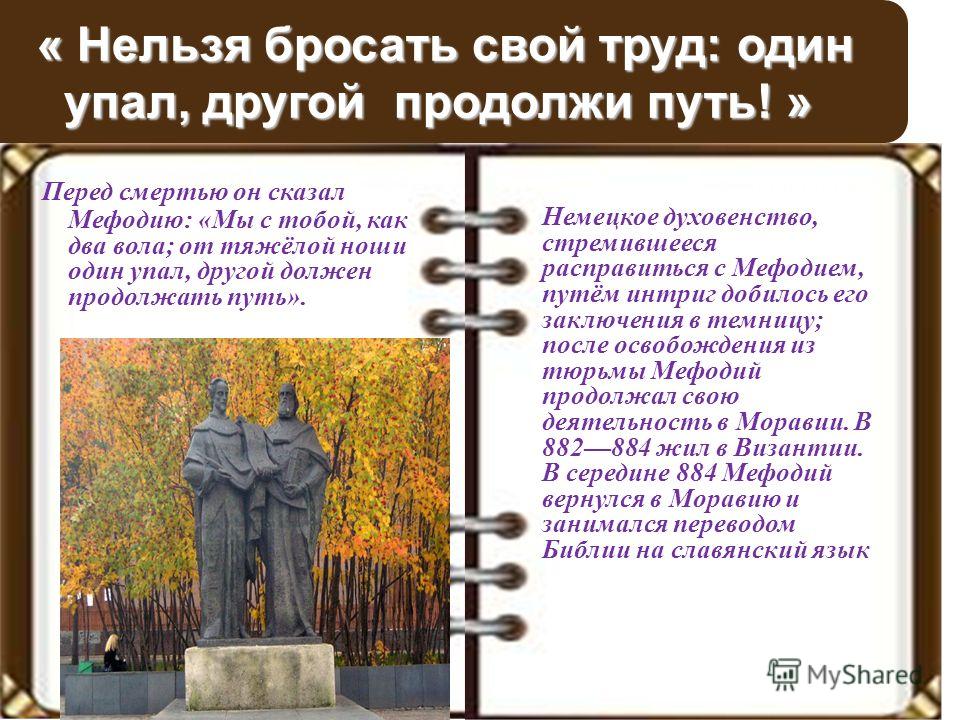
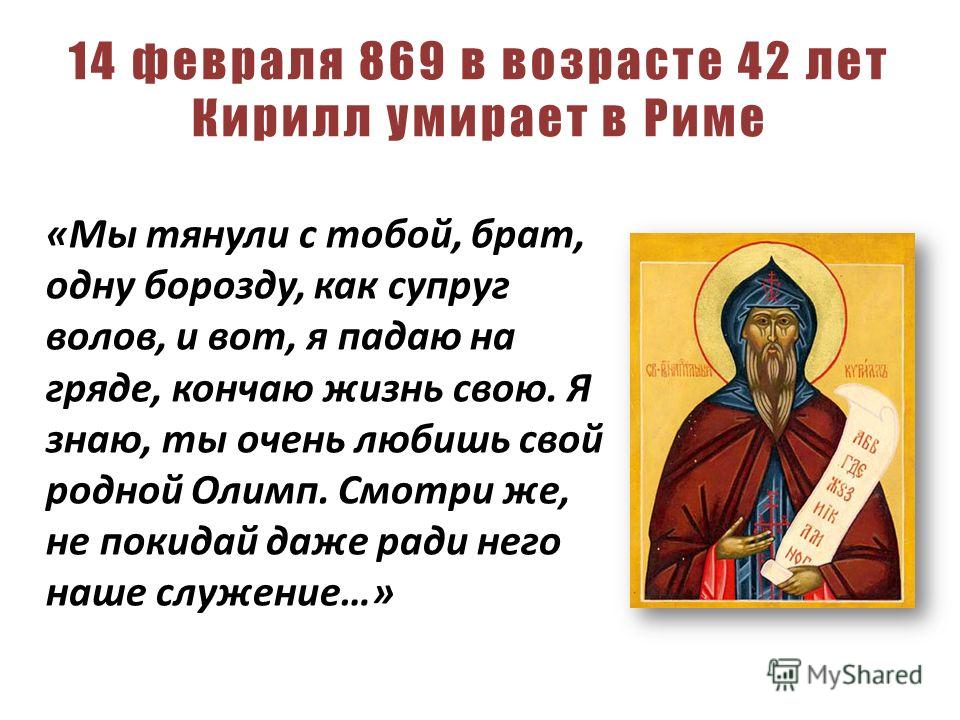
Thanks to the activities of St. Methodius, both Czechs and Poles entered into a military alliance with Moravia, opposing the influence of the Germans. Methodius predicted the day of his death and died on April 6, 885. After the death of his brother, Methodius continues the gospel sermon among the Slavs “I did not keep silent out of fear and always remained awake on guard”

Slavic alphabets: Cyrillic and Glagolitic Glagolitic Cyril and Methodius “transferred” the sounds of the Slavic language to parchment using that glagolitic. Inscriptions of letters were not preserved Cyrillic In 893, Cyrillic appeared, which eventually replaced the Glagolitic in all Slavic countries. Russian alphabet Church Slavonic alphabet Church Slavic alphabet
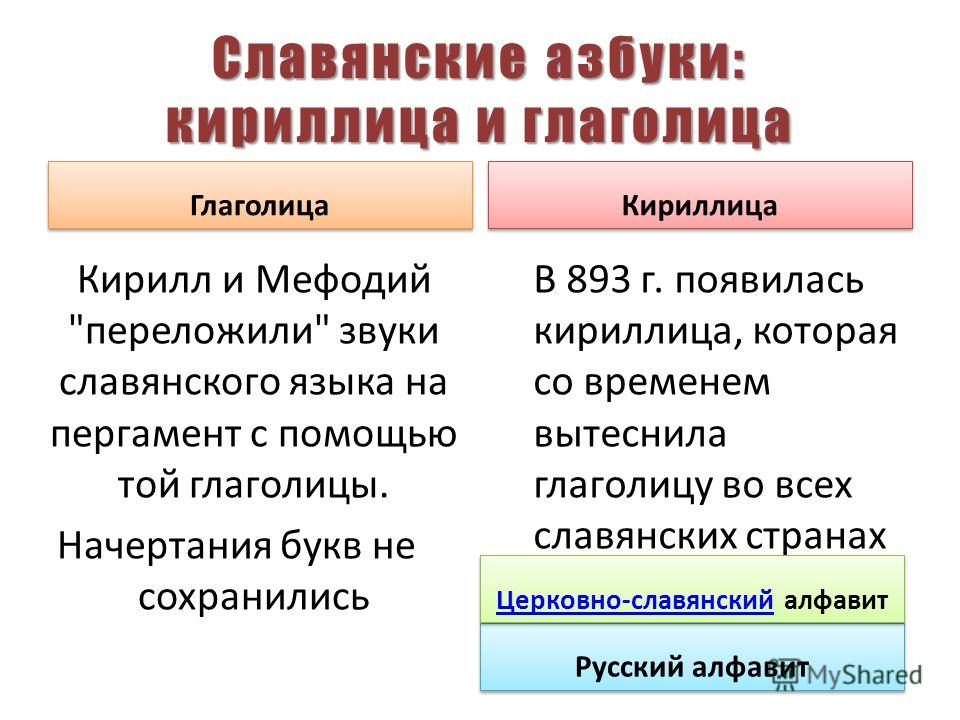
Therefore, Cyril decided to compose an alphabet in which there would be all the letters that are needed for the Slavic language. As a result, in the Slavic alphabet created by Cyril, 43 letters turned out. May 24, 863 in the city of Plisk, the brothers Cyril and Methodius announced the creation of the Slavic alphabet. Glagolitic

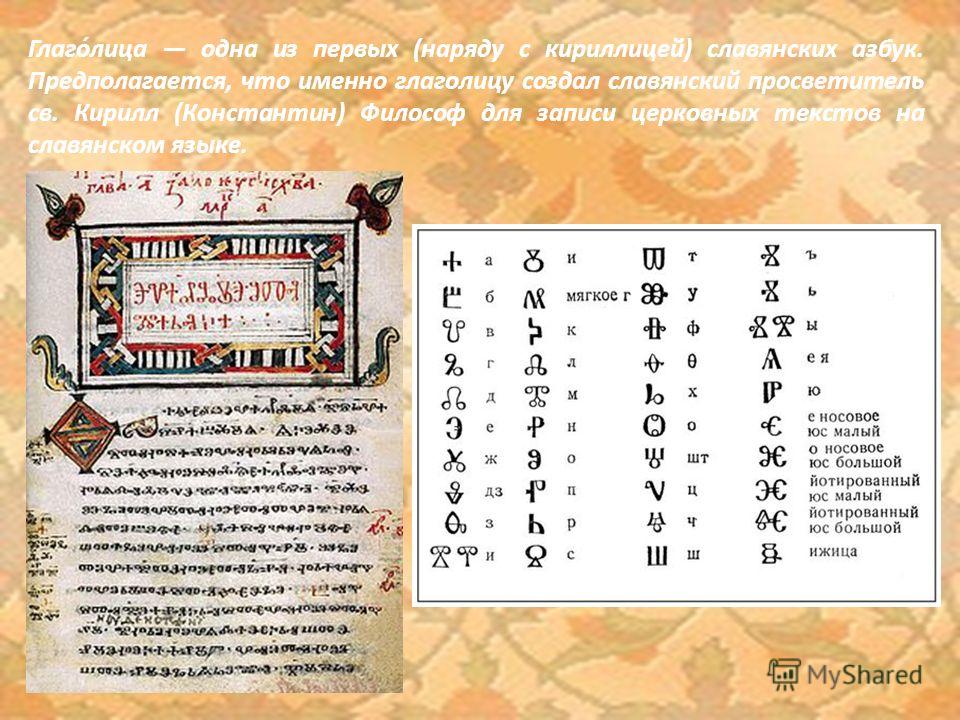
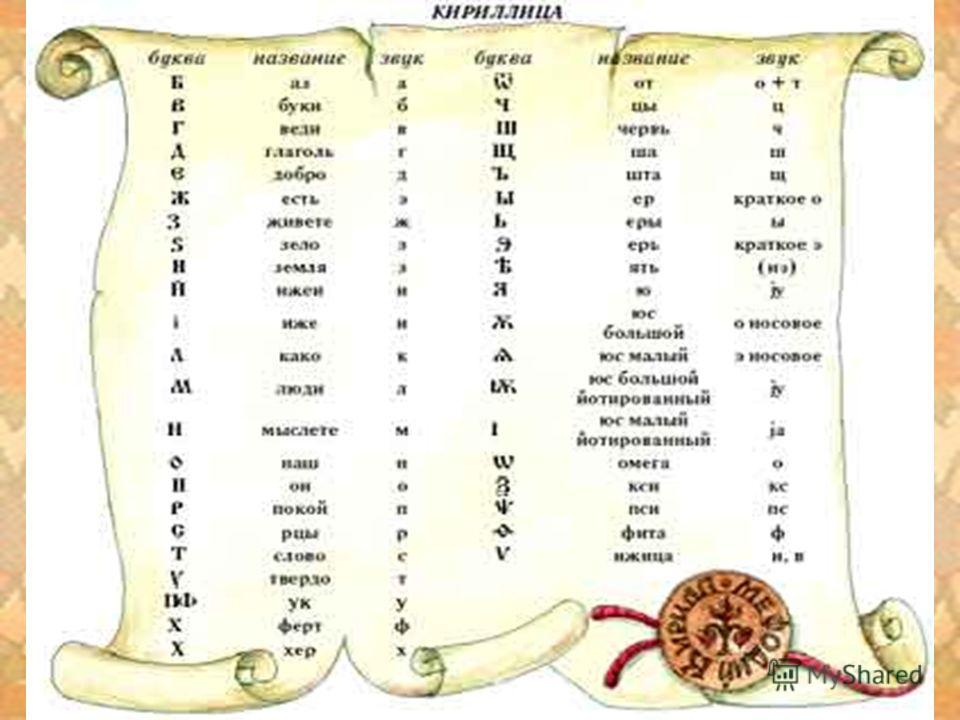
![]()

Cyrillic letter The letters for the Greek statutory alphabet served as a model for writing the letters of the Cyrillic alphabet. The Charter is a letter when letters are written right at the same distance from each other, without tilt - they are "fixed"
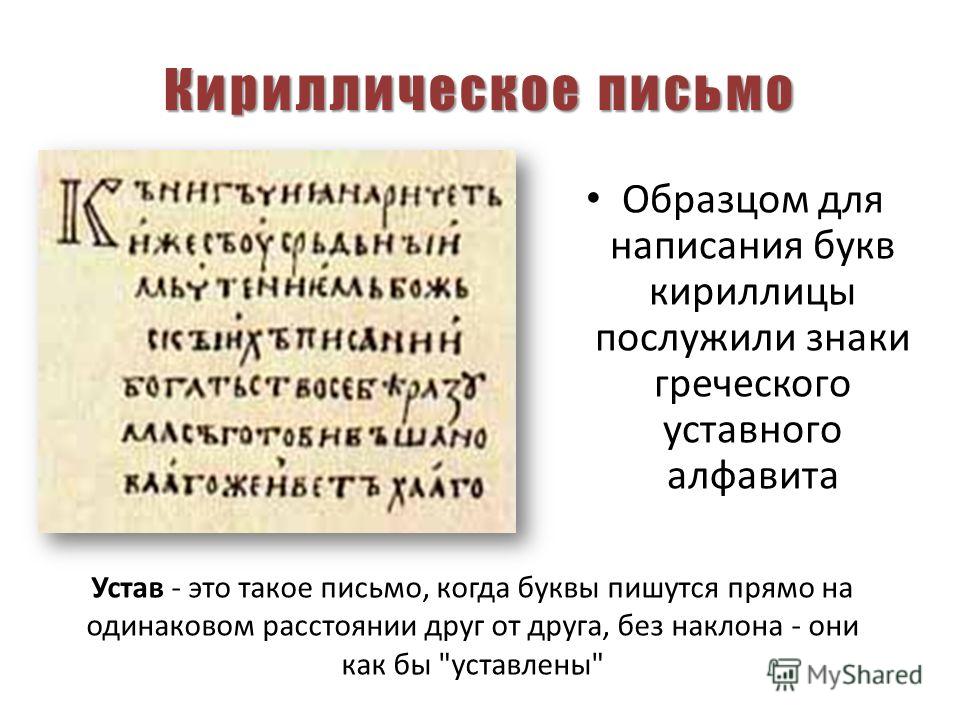


“They were able to explain to us faith in our native language”. The ABC of Cyril and Methodius came to Russia. Prince Vladimir accepted the Orthodox faith and called on teachers - students of Cyril and Methodius. Orthodox Russia shone with gold domes, liturgical books of Russia became worth its weight in gold. And at the monasteries the first Russian schools opened.
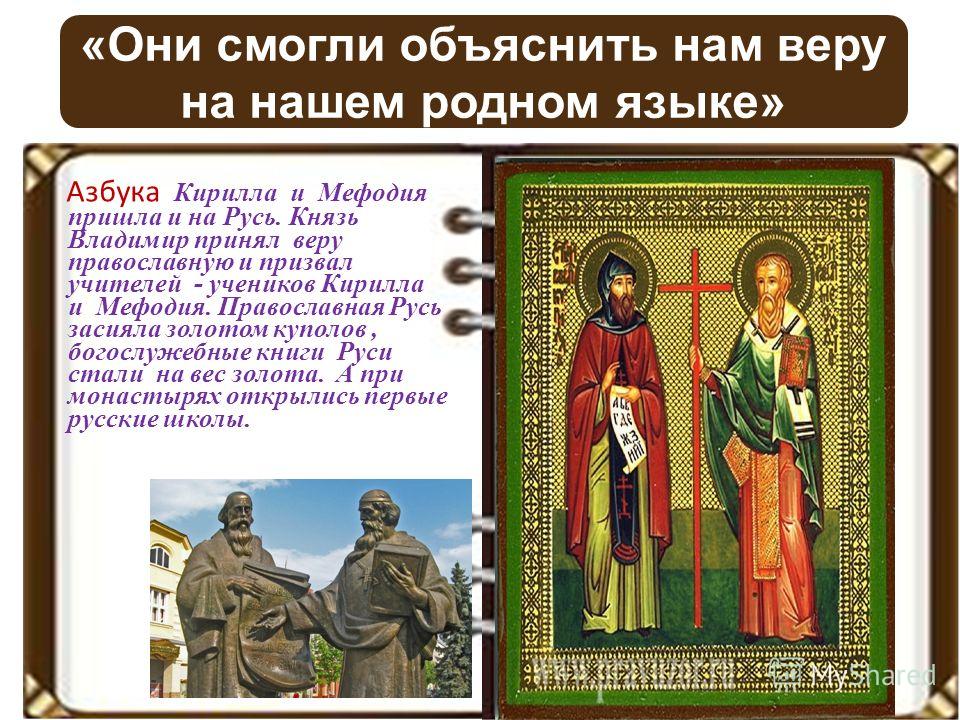

The highest reward for the works is the reckoning of saints. When Cyril gave Pope Adrian II the relics of St. Clement, the pope approved the service in Slavic, and ordered the translated books to be placed in Roman churches. Methodius was ordained a bishop.

Cyrillic letter The oldest book in Russia, written in Cyrillic, is the Ostromir Gospel of the year. During the time of Peter the Great, changes were made in the styles of some letters, and 11 letters were excluded from the alphabet. The new alphabet has become poorer in content, but simpler and more adapted to printing various civilian business papers. He got the name "civilian". In 1918, a new alphabet reform was carried out, and the Cyrillic alphabet lost four more letters: Yat, and (I), Izhitsa, Fitu.




Order “Saints Equal to the Apostles Cyril and Methodius” (Bulgaria) 3-degree 2-degree 3 degree silver bronzry 1-degree gold The first awards in Bulgaria were awarded to scientists back in 1814. And in 1950 the Order of three degrees “For Merit to the Fatherland” was established "

The Order named after Saints Cyril and Methodius The Order is awarded to outstanding representatives of science, education and enlightenment, culture, journalism of the Slavic Countries. The order is awarded in a festive atmosphere in the city of Moscow. Every year on May 24 in all Slavic countries solemnly glorify the creators of the Slavic writing Cyril and Methodius. This holiday unites more Slavs around the planet .. The Order named after Saints Cyril and Methodius was established by the International Academy of Slavic Writing named after Saints Cyril and Methodius
As you know, our today's alphabet goes back to the letters of the Cyrillic alphabet - the Slavic alphabet created by Constantine the Philosopher, in the monasticism of Cyril.
Legend has it that God revealed the Philosopher's writings at the time of prayer. And historical sources specify: before Konstantin had a divine revelation, he studied sacred languages \u200b\u200bfor a long time. Hebrew, Greek and Latin were considered such languages. Scripture existed in these languages. At the last two services were held.
In the sacred texts, everything made sense: not only the content, but also the form of the record, even the arrangement of the letters of the alphabet. And Konstantin, who perfectly knew the wisdom of his time (not without reason he was called the Philosopher!), Created the Slavic alphabet in the "image and likeness" of the sacred alphabets. Recall: the alphabet was created by him with well-defined goals. He was a missionary and preached Christianity among the Slavs. And for Christian ideas to meet love and understanding, they must be stated in their native language, the Philosopher believed. But it was not difficult for a heretic to pass for such a way of thinking, because Konstantin, trying to avert possible accusations from himself, followed the canons of the sacred letter he had learned and "arranged" the Slavic alphabet as a model of the world and as a story of a righteous and unrighteous person.
Az and beeches - the first two letters of the Cyrillic alphabet, which formed the familiar word "alphabet", designated two characters, two characters.
Az is a good born “to be the first”, “a bright prince”.
Beeches - a bad, empty person, a meaningless creature. (Hence the custom of frightening children with Buka.)
Accordingly, the letters in the Cyrillic alphabet were not arranged in a line and not in an arbitrary column, as we used to write the alphabet, but in two columns with a certain number of letters. In the right column (the word "right" comes from the word "truth") - "good" letters associated with Az-first, in the left - "bad" letters, "Bukina".
The names of the Cyrillic letters were, as you know, the words: “lead”, “verb”, “good”, “eat”, “live”, etc. From these words came two stories. One told of the life of Az - the righteous, striving for truth and attaining the highest glory and eternal life, the other - about the life of Buki - empty, mired in vanity, who became a thief and a swindler, a renegade and heretic who was caught, tortured, thrown into prison and in finally put to death a fierce death.
These stories were examples of an appropriate and inappropriate life that a schoolboy got to know when embarking on literacy. They sounded like parting words to a person choosing a life path, urged them to study, think and love the Word.
Even in the writing of the letters of the right and left column, their involvement in the fate of the Az-righteous and Buki-empty was reflected. The letters of the right side were written and remembered easier. The letters on the left side had a complex, elaborate form, it was much more difficult to master them. So everything in this alphabet worked for moral education: the student had to learn the life lesson he was offered in language, eyes, and hands.
Over time, the letters lost their original name: Az turned from the letter a, Buki into the letter b (be), lead - into v (ve), etc.
The writing of letters is simplified, and many letters of the left column have completely disappeared from use. The alphabet is no longer sacred to us and parting words to life.
But maybe the children will be interested to know why in the old days the kids were scared by Buka.
And the letter denoting a personal pronoun did not always stand in last place. In Old Slavonic, the word “I” sounded like “Az.” And with the letter "Az" began the Old Slavonic alphabet. One of the most important phrases was the phrase: “I am the man!” And she meant that man was created in the image and likeness of God.
History of Az-First
“Initially, the First: lead the doctrine, speak and act kindly, live by nature; work hard, love your land, comprehend the essence of the universe; as thinking people, our brother is loving, you will pronounce the word firmly, strengthen the law, gain glory, eternal life. ”
History of Buki
“You will be beginningless - you will end vilely, uterine creature; vain trash, thief, drunkard, heretic enemy, a bitter share will fall out, fanatics will be caught, harassed, imprisoned in the prison, executed; you will die a dog stinking dust. "
According to the book of A.V. Zinoviev "The Cryptography of the Cyrillic alphabet" (Vladimir, 1991)
Retold by Irina Osina
She speaks soundlessly
But it’s clear and not boring.
You talk more often with her -
You’ll become four times smarter.
(Book)
That's right, and today is our class hourOrthodox Book Day . And how did writing appear in Russia? To whom should we say thanks for using the written speech?
1 reader Look back at our ancestors
On the heroes of past years.
Remember them with a kind word
Glory to them severe fighters!
Glory to our side!
Glory to Russian antiquity!
And about this old
I'll start telling
So that people can know
About the affairs of the native land ...
2 reader In the monastery cell narrow
In the four blank walls, A monk wrote down the earth about Old Russian Life ...
Indeed, the book was created for our happiness and salvation.
A word ... A sound that lives for a split second and disappears into space. Maybe there’s nothing to talk about. But the word is a gift of God. After all, in the beginning was the Word. And the first word was - God. The Word of God was embodied in Slavic speech thanks to the solunky brothers Cyril and Methodius, the creators of the Church Slavonic language. This word of God is the Book of Books, the Bible, otherwise the Gospel. Pupils learned the Slavic alphabet from the ABC book: az, beeches, lead, verb, good. All schools were at the temple, and teachers were church ministers.
Wake up early
Wash your face white
Get ready for God's church
Begin the alphabet!
Many years have passed since then. People learned to print not only church books, but also popular novels, magazines, and various press. But lest we read, we must not desecrate our speech, which Cyril and Methodius created in order to write down the very first and main book - the Bible. Before the advent of typography, it was rewritten many times, and not a single mistake was made. We start our story with this book.
"The Bible or the Gospel."
There are many Orthodox books in my home library. But the most important of them is the Bible. Since ancient times, it was called the Book of Books. It consists of two parts: the Old and New Testaments. The New Testament tells about the life of Jesus Christ. The Four Apostles wrote down the New Testament or Gospel: Matthew, Mark, Luke and John.
With love for his neighbors a flame, The people humbly he taught; He subordinated all the laws of Moses of Love to the law. He professes forgiveness; He orders that evil be paid with good; There is an unearthly power in it. Aiming ailment, treating flour, Everywhere he was a savior. And he extended a good hand to everyone, And he did not condemn anyone.
IN863 Slavic alphabet was created in the year.This year is considered the year of birth of the Slavic alphabet. Slavic alphabet existed in two versions:glagolitic – from the verb - “speech” andcyrillic .
In the first Slavic alphabet there were 40 letters. She was called"Glagolitic" and her brothers created it on the basis of three Christian symbols - a cross, circle and triangle, independently of other alphabets.
Later, in Bulgaria, the students of Cyril and Methodius invented the second and main Slavic alphabet -cyrillic alphabet Cyril. Each letter of the Cyrillic alphabet was special. She had the name: A - az, B - beeches, C - lead, G - verb, D - good, E - eat, F - live, 3 - green, earth, L-people, M - think, P - peace, R - rtsy, speech, C - word, T-firmly ... In addition, the letters could also indicate the numbers: "az" - 1, "lead" - 2, "verb" - 3.
The creators of the alphabet tried to make the letters simple, clear, soft in writing. Cyrillic is still considered one of the most convenient writing systems. And the names of Cyril and Methodius, "the first teachers of Slovenian", became a symbol of spiritual achievement.
Russian alphabet is a completely unique phenomenon among all the known methods of letter writing. In the alphabet, and only in it, there is content.
The creators of the Slavic alphabet Cyril and Methodius did not accidentally give the names of the letters. They wanted the alphabet to sound meaningful, affirming the value of words and thoughts.
Using the Old Slavonic language, the scribes brought it closer to their native languages \u200b\u200b- Russian, Serbian, Bulgarian. This version of Old Slavonic is now called Church Slavonic.
SLAVIC PEOPLE thanks the Primary teachers of Slovenia.
Monuments to Cyril and Methodius are in Croatia, Bulgaria, In Russia.
On the day of Slavic writing and culture, a prayer service is held on Slavyanskaya Square in Moscow.
In 2004, Samara became the all-Russian center for the Days of Slavic Writing and Culture.
In wide Russia - our mother
The bells are ringing.
Now the brothers saints Cyril and Methodius
For their labors glorified.
Remember Cyril with Methodius,
Glorious brothers, equally apostles,
In Belarus, Macedonia,
In Poland, Czech Republic and Slovakia.
They praise the wise brothers in Bulgaria,
In Ukraine, Croatia, Serbia.
All the nations that write in Cyrillic
What are called since ancient times Slavic
Praise the feat of the first teachers,
Their Christian enlighteners.
Once upon a time, when the history of a great Russian power was just beginning, “it” was very expensive. She alone could be exchanged for a herd of horses, a herd of cows, for sable fur coats. And the point here is not the jewelry in which the beauty and the clever were dressed up.
And she walked only in embossed leather, in pearls and precious stones! Gold and silver clasps adorned her outfit! Admiring her, people said: “Light, you are ours!” ... What kind of wonder is this? This is Her Majesty - BOOK.
She has preserved to us the Word of God and the traditions of distant years.
A deep bow and thanks to Cyril and Methodius! Our respect is for Orthodox books that teach us to be kind, fair, patient and loving, books whose authors dreamed that the world would become cleaner and brighter. We will remember this always and everywhere.


